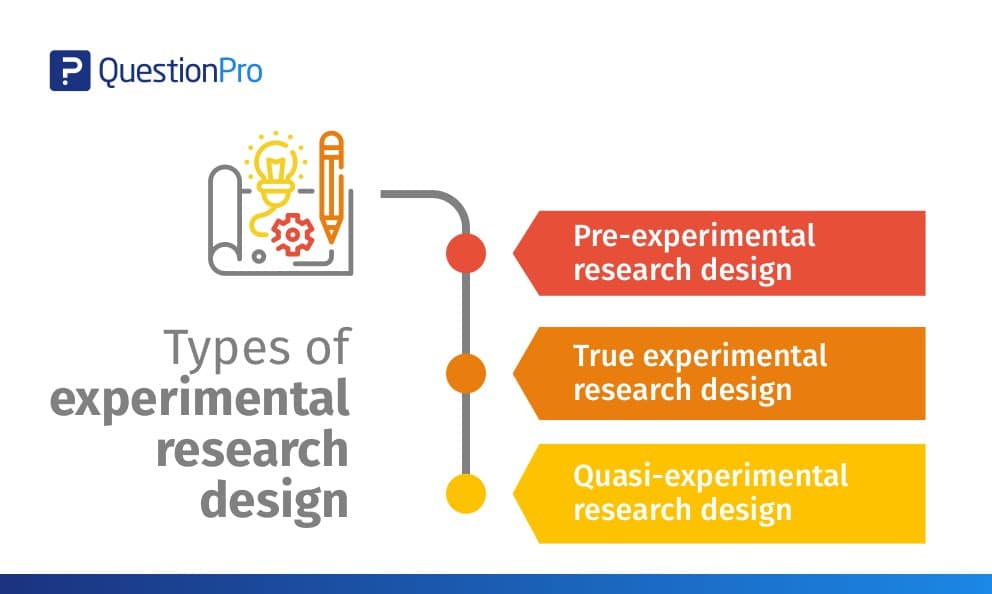 Reading Time: 4 minutes read
Reading Time: 4 minutes read
Any research conducted under scientifically acceptable conditions uses experimental methods. The success of experimental studies hinges on researchers confirming the change of a variable is based solely on the manipulation of the constant variable. The research should establish a notable cause and effect.
What is Experimental Research?
Experimental research is a study conducted with a scientific approach using two sets of variables. The first set acts as a constant, which you use to measure the differences of the second set. Quantitative research methods, for example, are experimental.
If you don’t have enough data to support your decisions, you must first determine the facts. This research gathers the data necessary to help you make better decisions.
You can conduct experimental research in the following situations:
- Time is a vital factor in establishing a relationship between cause and effect.
- Invariable behavior between cause and effect.
- You wish to understand the importance of cause and effect.
Experimental Research Design Types
The classic experimental design definition is: “The methods used to collect data in experimental studies.”
There are three primary types of experimental design:
- Pre-experimental research design
- True experimental research design
- Quasi-experimental research design
The way you classify research subjects based on conditions or groups determines the type of research design you should use.
01. Pre-Experimental Design
A group, or various groups, are kept under observation after implementing cause and effect factors. You’ll conduct this research to understand whether further investigation is necessary for these particular groups.
You can break down pre-experimental research further into three types:
- One-shot Case Study Research Design
- One-group Pretest-posttest Research Design
- Static-group Comparison
02. True Experimental Design
It relies on statistical analysis to prove or disprove a hypothesis, making it the most accurate form of research. Of the types of experimental design, only true design can establish a cause-effect relationship within a group. In a true experiment, three factors need to be satisfied:
- There is a Control Group, which won’t be subject to changes, and an Experimental Group, which will experience the changed variables.
- A variable that can be manipulated by the researcher
- Random distribution
This experimental research method commonly occurs in the physical sciences.
03. Quasi-Experimental Design
The word “Quasi” indicates similarity. A quasi-experimental design is similar to an experimental one, but it is not the same. The difference between the two is the assignment of a control group. In this research, an independent variable is manipulated, but the participants of a group are not randomly assigned. Quasi-research is used in field settings where random assignment is either irrelevant or not required.
Importance of Experimental Design
Experimental research is a powerful tool for understanding cause-and-effect relationships. It allows us to manipulate variables and observe the effects, which is crucial for understanding how different factors influence the outcome of a study.
But the importance of experimental research goes beyond that. It’s a critical method for many scientific and academic studies. It allows us to test theories, develop new products, and make groundbreaking discoveries.
For example, this research is essential for developing new drugs and medical treatments. Researchers can understand how a new drug works by manipulating dosage and administration variables and identifying potential side effects.
Similarly, experimental research is used in the field of psychology to test theories and understand human behavior. By manipulating variables such as stimuli, researchers can gain insights into how the brain works and identify new treatment options for mental health disorders.
It is also widely used in the field of education. It allows educators to test new teaching methods and identify what works best. By manipulating variables such as class size, teaching style, and curriculum, researchers can understand how students learn and identify new ways to improve educational outcomes.
In addition, experimental research is a powerful tool for businesses and organizations. By manipulating variables such as marketing strategies, product design, and customer service, companies can understand what works best and identify new opportunities for growth.
Advantages of Experimental Research
When talking about this research, we can think of human life. Babies do their own rudimentary experiments (such as putting objects in their mouths) to learn about the world around them, while older children and teens do experiments at school to learn more about science.
Ancient scientists used this research to prove that their hypotheses were correct. For example, Galileo Galilei and Antoine Lavoisier conducted various experiments to discover key concepts in physics and chemistry. The same is true of modern experts, who use this scientific method to see if new drugs are effective, discover treatments for diseases, and create new electronic devices (among others).
It’s vital to test new ideas or theories. Why put time, effort, and funding into something that may not work?
This research allows you to test your idea in a controlled environment before marketing. It also provides the best method to test your theory thanks to the following advantages:

- Researchers have a stronger hold over variables to obtain desired results.
- The subject or industry does not impact the effectiveness of experimental research. Any industry can implement it for research purposes.
- The results are specific.
- After analyzing the results, you can apply your findings to similar ideas or situations.
- You can identify the cause and effect of a hypothesis. Researchers can further analyze this relationship to determine more in-depth ideas.
- Experimental research makes an ideal starting point. The data you collect is a foundation for building more ideas and conducting more action research.
Whether you want to know how the public will react to a new product or if a certain food increases the chance of disease, experimental research is the best place to start. Begin your research by finding subjects using QuestionPro Audience and other tools today.




















